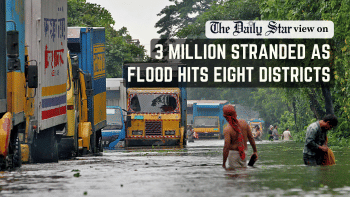We must reduce our vulnerability to flood

The ongoing flood has once again highlighted the need for taking decisive actions to reduce our vulnerability to seasonal disasters. With climate change, our internal river management problems, and unresolved external issues with India exposing the fault lines for a country otherwise known for its disaster preparedness, the time has come for Bangladesh to approach this issue with the urgency that it deserves, especially considering the huge human and economic tolls. Reports coming from the ground are quite alarming: at least 15 lives lost and 48 lakh people affected in 11 districts as of Friday afternoon. Earlier, it was reported that over 887,000 families were marooned, with about 77 upazilas under water.
The Feni and Cumilla situations remain as dire as before. In Cumilla, the collapse of an embankment on the Gumti River has left about 500,000 people stranded. People in other districts including Khagrachhari, Noakhali, Chattogram, Moulvibazar, Habiganj, Brahmanbaria, Sylhet, Lakshmipur and Cox's Bazar are also facing severe challenges. Despite all that, one reason to be hopeful about the direction in which Bangladesh is going at present is the spontaneous response of people to help with the aid and rescue efforts. Besides government initiatives in collaboration with the military, coast guard, and emergency services, private platforms and student volunteers have turned up in large numbers, reflecting the nation's solidarity at this moment of crisis. They are working despite considerable hurdles, including lack of electricity and mobile network and impassable roads, with a large number of people in flood-hit districts still disconnected.
That said, we must turn our focus to what's causing the severe flooding and how to reduce our vulnerabilities. Since August 19, the country's eastern region has experienced extremely heavy rainfall for three consecutive days, the highest in 53 years. This, combined with upstream flooding and the narrowing of water drainage paths in Bangladesh, has rapidly deteriorated the situation. This was compounded by inadequate early warning systems. A critical factor in this is the lack of warning about upstream water flows from the Indian authorities, which experts say has exacerbated the situation. Effective cross-border water management and better coordination with India are essential to improve our response. The Joint River Commission and the National River Conservation Commission (NRCC) have a huge role to play in this regard, which they must do.
In addition to cross-border river issues, encroachments and blockages in Bangladesh's river systems are another major concern. The estimates given by the NRCC about river encroachers show how the latter have encroached river land across the country, exacerbating the impact of flooding. Going forward, we must bring these encroachers to book and improve water flow in our rivers. A comprehensive approach to flood management is necessary. This includes restoring natural river channels, addressing encroachments, and strengthening regional cooperation and the effectiveness of relevant institutions to prevent future disasters. Given the repetitive nature of flash floods caused by upstream flows, experts have also said it is time the government approached floods not just from the perspective of river management but also that of security.


 For all latest news, follow The Daily Star's Google News channel.
For all latest news, follow The Daily Star's Google News channel. 










Comments